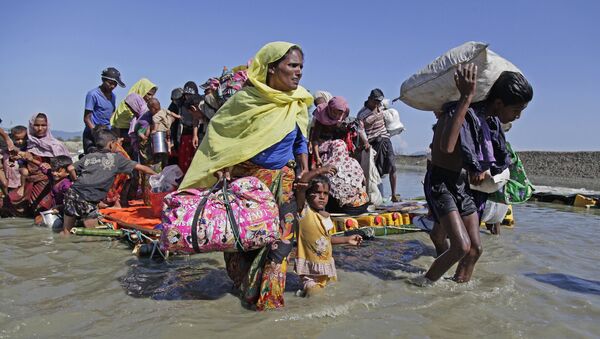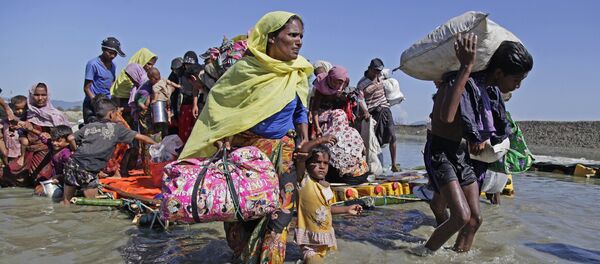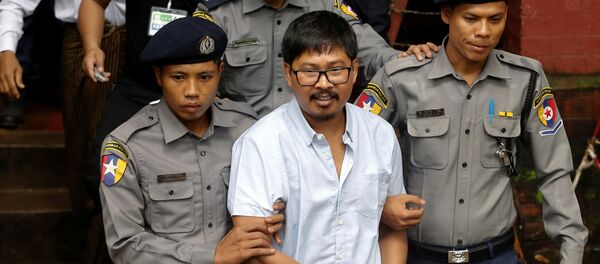The process of repatriating Myanmar's displaced Rohingya refugees, the majority of whom are currently residing in the Bangladeshi city of Cox’s Bazar, is hindered by the fact that they have not been notified of the repatriation agreement concluded between the two countries, Myanmar's ambassador to Russia told Sputnik.
READ MORE: Over 60% of Canadians Back Acceptance of Rohingya Refugees — Poll
"To our surprise, they are not aware of anything about the repatriation process. Apparently, they were not notified by the Bangladeshi authorities on the current bilateral arrangements, nor were provided any forms to be filled in for the necessary repatriation process," the ambassador said.
In this regard, he stressed the need to increase refugees' awareness of the repatriation process and improve its transparency.
According to the ambassador, Bangladeshi claims that 300,000-400,000 refugees are eligible for the repatriation program are "much inflated."
On ARSA Insurgent Group Impeding Return of Refugees to Myanmar
The threat of Arakan Rohinga Salvation Army (ARSA) insurgency group "remains real and present today" in Myanmar as it continues "to intimidate and kill those who advocate the return of displaced persons," who had to flee as a result of the escalation of tensions in the country's Rakhine region last August, the ambassador noted.
He indicated that the insurgent activities of the group have forced not only Rohingya refugees to flee, but also many other minority groups, such as the Daingnet, Hindus, Mro and Mramagyi, which went unnoticed by the global community.
"We regret the fact that their plight had been totally and conveniently overlooked by the international community and that some had gone even further to glorify or advocate the terrorist group," the ambassador stated.
On UN's Human Rights Chief's Actions and Remarks with Regards to Myanmar Rohingya Crisis
Myanmar's Ambassador advised the UN High Commissioner for Human Rights Zeid Raad Al Hussein to abide by the organization's code of conduct when he threatens to refer Myanmar to the International Criminal Court over the Rohingya refugee crisis.
He also stressed that Zeid, as a UN commissioner, had to adhere to the principle of impartiality as a fundamental ethical value of the organization.
READ MORE: Bangladesh Urges India to Mount Pressure on Myanmar Regarding Rohingya Crisis
The diplomat recalled that, according to the ICC Statute, cases concerning genocide, offenses against humanity, war crimes and crimes of aggression can be referred to the court, stressing that in this regard, he did not see any reason for the ICC to accept a case concerning Myanmar government.
In early July, Zeid called on the UN Security Council to immediately refer Myanmar to the ICC over the Rohingya refugee crisis. He harshly criticized the nation's government for its repatriation program for the Rohingya, who were forced to flee the country as a result of what he described as an "ethnic cleansing campaign," saying that it existed only on paper, and not a single refugee had officially returned to Myanmar.
Revisiting Rohingya Crisis in Myanmar
In late November, Bangladesh and Myanmar signed an agreement on the repatriation of Rohingya refugees, who fled the country for Bangladesh after the conflict in Rakhine state escalated. The agreement did not set the date for the end of the repatriation process, but media has speculated that Bangladesh expected to finalize Rohingya repatriation within one year.
READ MORE: Indian Home Minister to Visit Bangladesh: Anti-Terror Cooperation High On Agenda
The international community has considered the Rohingya refugee crisis a direct result of Myanmar's military offensive, launched following the August attack. The operation, which initially only targeted ARSA insurgents, has turned into a crackdown on all Rohingyas. The authorities of Myanmar, in turn, refuted such allegations and stressed that the military offensive aimed to ensure the country's security and targeted only militants, but never civilians.





